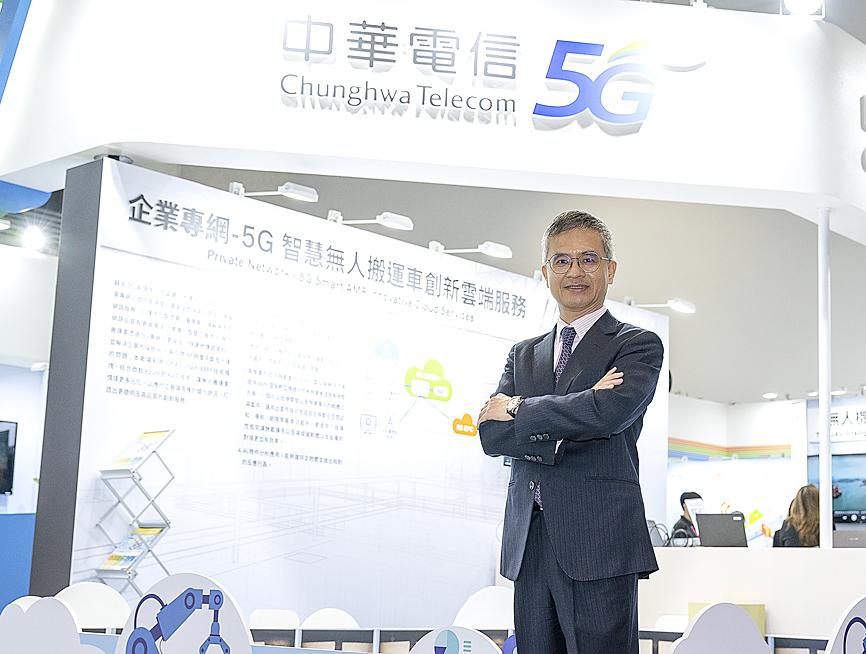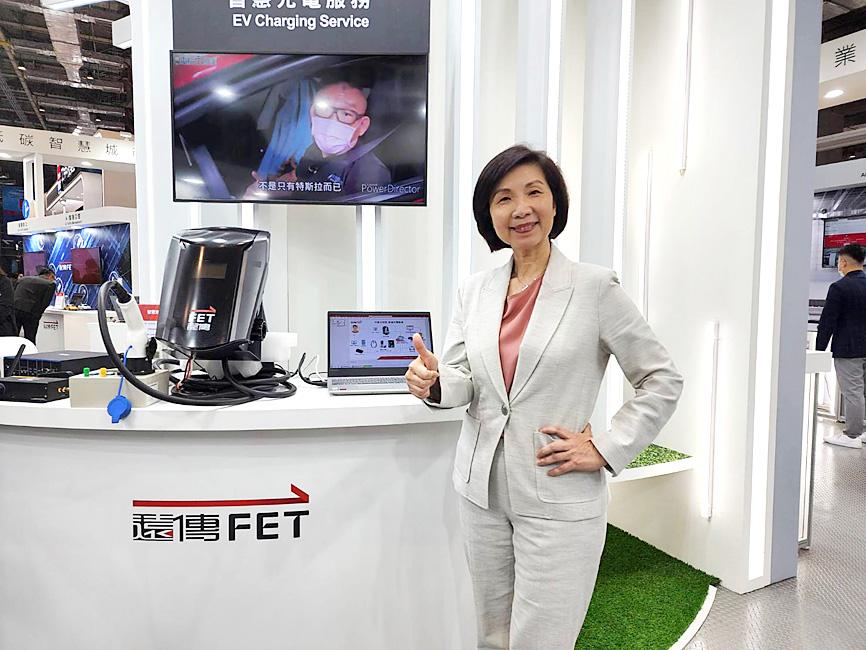Chunghwa Telecom Co (中華電信) yesterday said it aims to double the number of private networks deployed for enterprise customers this year, allowing manufacturers and logistics companies to build smart factories or automate operations.
The nation’s biggest telecom said 5G technology is a game changer, as it provides services and has the level of reliability, speed and communications coverage necessary for smart manufacturing and smart transportation, as well as other services that cannot be fulfilled using 4G technology.
With its 5G services entering their second year, Chunghwa Telecom aims for a private network revenue of NT$1 billion (US$35 million) this year, vice president Chia Chung-yung (賈仲雍) told reporters on the sidelines of the annual Smart City Summit and Expo.

Photo courtesy of Chunghwa Telecom Co
“Building private networks for enterprise customers is still an emerging business,” Chia said.
Chunghwa Telecom said it last year secured about 30 programs to help customers create private networks with dedicated 5G-enabled bandwidth and infrastructure that meet their specific connectivity needs.
The company aims to double that number this year, it said.

Photo: CNA
Revenue contribution from such services are projected to reach NT$70 billion this year, accounting for one-third of Chunghwa Telecom’s total revenue, it said.
The telecom said it provides tailor-made private networks for a wide range of sectors from manufacturing, agriculture and healthcare to steel and logistics.
Chunghwa Telecom said it has extended its services overseas. It has secured 5G-enabled private network projects from its partners in Thailand and is in talks with other customers in Southeast Asia. The company declined to disclose the names of its partners.
Separately, Far EasTone Telecommunications Co (遠傳電信) yesterday said revenue from non-telecom services, such as information and communication technology, cloud-based services and Internet of Things, is expected to grow by double-digit percentages this year from last year.
Far EasTone expects growth to come from smart city-related services, remote medical treatment and monitoring, and cloud-based digital transformation solutions, company president Chee Ching (井琪) told reporters on the sidelines of the expo.
Far EasTone yesterday showcased a new smart traffic signal uninterruptible power system (UPS) for Gogoro Inc (睿能創意), an electric scooter maker and battery swapping service provider.
The smart traffic signal UPS is equipped with two swappable Gogoro smart batteries that can maintain traffic signals for up to three-and-a-half hours, and are connected to Far EasTone’s UPS monitoring platform to perform real-time monitoring and power outage alerts, Gogoro said in a statement.
Maintenance teams can detect an outage and repair it quickly, and if the outage lasts longer, maintenance teams can swap out depleted batteries for fresh ones to extend the service time of the signal, it said.

CHIP RACE: Three years of overbroad export controls drove foreign competitors to pursue their own AI chips, and ‘cost US taxpayers billions of dollars,’ Nvidia said China has figured out the US strategy for allowing it to buy Nvidia Corp’s H200s and is rejecting the artificial intelligence (AI) chip in favor of domestically developed semiconductors, White House AI adviser David Sacks said, citing news reports. US President Donald Trump on Monday said that he would allow shipments of Nvidia’s H200 chips to China, part of an administration effort backed by Sacks to challenge Chinese tech champions such as Huawei Technologies Co (華為) by bringing US competition to their home market. On Friday, Sacks signaled that he was uncertain about whether that approach would work. “They’re rejecting our chips,” Sacks

NATIONAL SECURITY: Intel’s testing of ACM tools despite US government control ‘highlights egregious gaps in US technology protection policies,’ a former official said Chipmaker Intel Corp has tested chipmaking tools this year from a toolmaker with deep roots in China and two overseas units that were targeted by US sanctions, according to two sources with direct knowledge of the matter. Intel, which fended off calls for its CEO’s resignation from US President Donald Trump in August over his alleged ties to China, got the tools from ACM Research Inc, a Fremont, California-based producer of chipmaking equipment. Two of ACM’s units, based in Shanghai and South Korea, were among a number of firms barred last year from receiving US technology over claims they have

BARRIERS: Gudeng’s chairman said it was unlikely that the US could replicate Taiwan’s science parks in Arizona, given its strict immigration policies and cultural differences Gudeng Precision Industrial Co (家登), which supplies wafer pods to the world’s major semiconductor firms, yesterday said it is in no rush to set up production in the US due to high costs. The company supplies its customers through a warehouse in Arizona jointly operated by TSS Holdings Ltd (德鑫控股), a joint holding of Gudeng and 17 Taiwanese firms in the semiconductor supply chain, including specialty plastic compounds producer Nytex Composites Co (耐特) and automated material handling system supplier Symtek Automation Asia Co (迅得). While the company has long been exploring the feasibility of setting up production in the US to address

OPTION: Uber said it could provide higher pay for batch trips, if incentives for batching is not removed entirely, as the latter would force it to pass on the costs to consumers Uber Technologies Inc yesterday warned that proposed restrictions on batching orders and minimum wages could prompt a NT$20 delivery fee increase in Taiwan, as lower efficiency would drive up costs. Uber CEO Dara Khosrowshahi made the remarks yesterday during his visit to Taiwan. He is on a multileg trip to the region, which includes stops in South Korea and Japan. His visit coincided the release last month of the Ministry of Labor’s draft bill on the delivery sector, which aims to safeguard delivery workers’ rights and improve their welfare. The ministry set the minimum pay for local food delivery drivers at